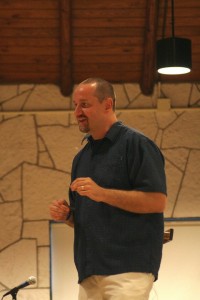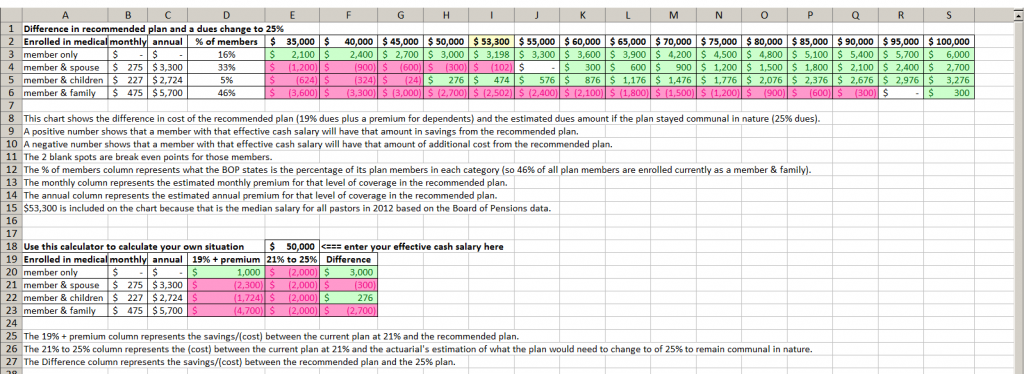My Take on the Board of Pensions’ Proposal – Shawn Coons
Read the essay by Jan Edmiston, “Another Voice on the 2014 Board of Pension Proposal”
Read the essay by Rob Warren, “How It Looks from Where I Serve”
Read the essay by Katie Barrett Todd, “A Need for Restored Hope”
In October of 2012, the Board of Pensions of the Presbyterian Church (USA) met in Hilton Head, SC where they made known fundamental changes to the nature of the medical plan that covers Presbyterian clergy. One of the key components of the medical plan is ‘call neutrality’ which means that the amount a church pays for health coverage for its pastor is dependent on the salary the church offers and not the age, health or life circumstances of the person who is called to be their pastor.
This means that churches are free to pick the best person for their pastor, rather than the one they can afford. Currently ministers who are older and typically have more health concerns, who need coverage for a spouse or child, or who have chronic illnesses, all cost the Board of Pensions more money, but their dues are calculated the same as everyone else’s.
Under the proposed plan, which will be voted on at the March Board of Pensions meeting being held at the Ritz Carlton in Philadelphia, churches who call ministers who need coverage for a spouse or child will be charged a flat fee for that coverage.
So two related things will happen if the ‘Dues Plus’ plan is approved:
1. Many churches will now find it cheaper to hire ministers who don’t need coverage for a spouse or child, making it even harder for many younger ministers to find a call.
2. Ministers with spouses and children will be asked to come up with an additional $2,500-$5,000 in 2014, and very likely more every year after that.
In this week’s series of posts you will hear how this will negatively impact several specific families and churches. You will learn about immediate financial and vocational consequences that will happen to men and women who have made promises to God and this denomination, and who now feel that the denomination is breaking promises made to them. You will hear about future ramifications that this decision will have for our denomination as a whole.
Since these proposed changes were made hundreds of clergy, candidates, presbytery execs, GA moderators, ruling elders, deacons and church members have spoken out in opposition to this plan. At the same time we realize that something must be done, because the medical plan is currently spending more money than it is taking in.
What many of us are asking is simply that the communal nature of our medical plan continue to be honored. The current plan is to balance the budget on those who need family coverage, and these clergy are typically younger. This makes little sense when the Board of Pensions has stated that costs are increasing because of “a population that’s getting older — As people age, they simply use more medical care.” (Question 12).
If any group should be paying more it should be older members, but that’s not how we do things in the Presbyterian Church. We bear one another’s burdens, and this burden should be shared equally.
The Board of Pensions has stated that if the Dues Plus plan is not approved then medical dues would need to be raised from the current 21% of a minister’s salary to 25% in order cover the current shortfall. I, and many others, believe that this is a more equitable solution.
The current proposal actually calls for the medical dues to shrink to 19%. This means that older members who are more likely not to need family coverage but are more likely to cost the medical plan more would actually be paying less. I don’t understand that logic. An aging population of ministers is driving up the cost, so the amount they are charged is reduced while the cost is disproportionately increased for many younger members.
This is not only non-sensical, it is also unjust. It’s a regressive dues structure that hits those who make the least money the hardest. There’s a well-done spreadsheet that compares the current proposal with raising dues to 25% across the board, and it compares it according to whether or not a minister needs family coverage and the salary of the minister.
In the image below, the chart at the top shows which proposal would cost more money. If the box is red then the current Dues Plus proposal costs more, if the box is green the increase to 25% would cost more money. The smallest salaries are on the left and the largest salaries are on the right. The left side is also where the most red is, which means that those who make the least will be paying the most when compared to sharing the burden equally across all churches.
How can we ask a pastor who serves a church for $40,000 a year to pay $5,000 more for the same coverage that she and her family currently has? Especially since the church whose pastor who makes $80,000 a year and does not need family coverage will actually be saving $1,600. In the face of historically high health costs how can any reduction in dues be justified?
We can do better than this, and we will if you help. www.noduesplus.com has collected more information and insight about these changes. There you will also find contact information for Board of Pensions members. Contact them and politely share your thoughts. Ask them to honor our traditions and principles.
We can do better than this.
Shawn Coons serves with his wife are Co-Pastors of Fairview Presbyterian Church, in Indianapolis. Shawn is also a geek, father of two grade school children, video gamer, Steelers Fan, and all around ordinary guy. He blogs at www.shawncoons.com.




Let me suggest a simple solution that I have not heard anyone mention. Simply go out and bring in ten new members into your congregation this year. After all, a key element in a pastor’s call is evangelism. If those ten new members give an average of $600 a year (a very modest pledge), the increased cost will be more than covered. Why ask other pastor’s to pay our way when we have every ability to take care of it ourselves?
Dear Anon:
You seem to have all of the answers based on your comments on each post from the BoP discussions. I would like to see you share them, but only after stepping into each unique situation presented here. You tell me how easy it is to “wrangle up” those 10 new members to pledge $600 each/year, then come to my congregation & make it happen.
Yes, there are problems with the system, but asking those who have daringly already stepped out in faith (and little salary) to continue to take a pay cut while others actually save money is unfair/unjust & frankly not an easy thing to fix based on what’s been proposed.
So, since you know all the answers, how do we fix it?